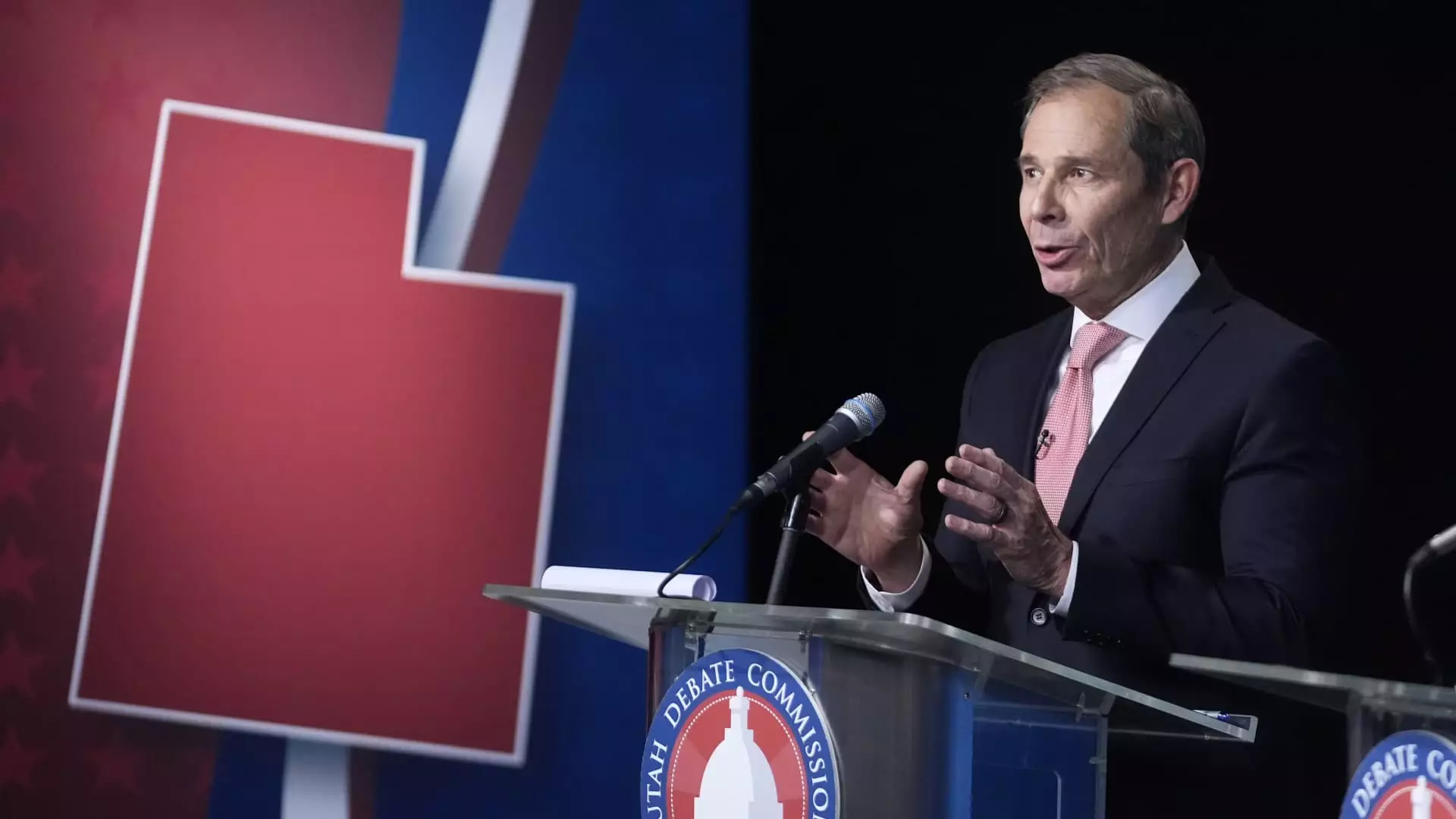The world of cryptocurrency is rapidly evolving, with numerous political figures coming to the forefront to champion the cause. One such figure is John Curtis, a Republican congressman from Utah, whose campaign for a U.S. Senate seat has garnered a surprising amount of support from the cryptocurrency sector. As the political landscape shifts in response to the digital asset revolution, Curtis stands out as a proponent for better regulation that prioritizes understanding and innovation within this complex industry.
John Curtis’s path to a Senate run has not followed a conventional trajectory. His background in telecommunications positioned him uniquely to tackle the issues surrounding internet accessibility that are closely linked to the crypto industry. Curtis recounted a moment at a recent event where he questioned Congress members about their experiences with internet speeds. The bemusement he faced illuminated a critical flaw: many lawmakers lack the nuanced understanding required to regulate technology effectively. This experience underscored for Curtis that legislative oversight should stem from real-world experience and a grasp of user needs, particularly in the rapidly changing landscape of cryptocurrencies.
This pivotal realization drove Curtis to advocate for a more knowledgeable approach to crypto regulations. The congressman emphasizes that when legislators lack insight into technological advancements, they risk creating frameworks that are misaligned with industry realities. This point resonates with crypto enthusiasts, whom Curtis has endeavored to rally around his campaign with a promise of informed, supportive regulation.
Curtis’s alignment with the crypto industry has also translated into significant financial backing for his Senate campaign. The Defend American Jobs PAC, which focuses specifically on crypto-related issues, has significantly bolstered his campaign through approximately $1.9 million in contributions. This backing is reflective of a broader trend where the cryptocurrency sector has increasingly engaged in political funding, recognizing the importance of electing leaders who are sympathetic to its goals.
The data shows a substantial movement of capital from the crypto realm into political races, a signal of the industry’s burgeoning influence in shaping legislative agendas. Recent reports indicate that nearly half of corporate donations this election cycle have emerged from the digital asset space, surpassing traditional industries like banking and oil. Curtis’s campaign is illustrative of the newfound power that crypto PACs wield, with their backing contributing to the success of candidates who share their vision.
The Call for Self-Regulation
One of Curtis’s main arguments revolves around the need for the cryptocurrency industry to self-regulate. By advocating for a framework that empowers the industry to establish guidelines voluntarily, Curtis believes stronger protections can be created without burdening innovation with over-regulation. He encourages industry leaders to proactively propose measures that ensure safety while preserving the entrepreneurial spirit that makes crypto appealing.
The necessity of balance is evident in Curtis’s discourse, as he grapples with the question of how to implement regulations that do not stifle technological advancement. His perspective highlights the importance of collaboration between industry and lawmakers, promoting a governance model that is both adaptive and informed. These discussions are essential as the government navigates how to approach an industry ripe with potential yet fraught with challenges.
The enthusiasm surrounding Curtis and other crypto-friendly candidates reflects the broader implications of integrating cryptocurrency into the political sphere. As evidenced by the endorsements he has received, the crypto community is systematically targeting legislative races where its backing can shift the balance of power. Notable races, including those for Senate positions in states like Arizona and Michigan, are earmarked by substantial financial contributions aimed at securing pro-crypto allies.
Moreover, the efforts extend beyond typical battleground districts, as crypto PACs seek to back candidates irrespective of their political affiliations. This nonpartisan approach underscores a fundamental shift in how cryptocurrencies are perceived by a diverse political audience. Prominent figures such as House Majority Whip Tom Emmer are vocal supporters of this movement, emphasizing the unifying potential of digital assets across political divides.
The rise of John Curtis and his backing from the crypto industry represents a pivotal moment in the intersection of technology and governance. As the digital currency landscape continues to evolve, the push for informed regulation and self-governance stands as a crucial factor in sustaining innovation. With entities like the Defend American Jobs PAC actively engaging in political discourse, the future may see a more robust alignment between cryptocurrency aspirations and legislative frameworks.
The journey for Curtis, alongside the digital asset community, underscores an ongoing transformation in political engagement within an industry that thrives on adaptability and change. As they advocate for a balanced regulatory landscape, the outcomes of their efforts could redefine not only the future of cryptocurrencies but also the nature of governance in a technology-driven world.

